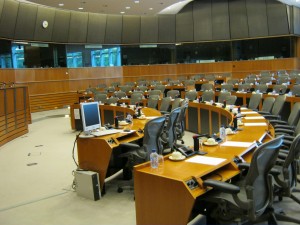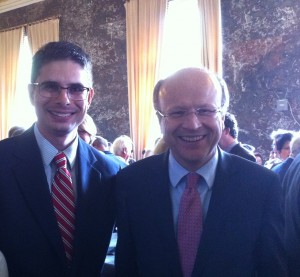RJ GAUDET & ASSOCIATES L.L.C.
"Let us realize the arc of the moral universe is long but it bends toward justice."
Dr. Martin Luther King, Jr.
Archive for the ‘Uncategorized’ Category
Peace Palace Turns 100 Years Old
This year, the Peace Palace in the Hague turns 100 years old.
The Peace Palace houses the International Court of Justice and the Permanent Court of Arbitration. It also contains the largest international law library in the world which is accessible to any researcher who approaches the gate and says they wish to visit the library. The library’s books are borrowed by judges in the International Court of Justice and lawyers in the ICTY and other international criminal tribunals. In short, these resources help craft a new generation of decisions in public international law.
Steel magnate Andrew Carnegie built the Peace Palace in 1913, 100 years ago. As he wished, the resources of the Peace Palace have been used to develop the rule of law and contribute to world peace. For students and practitioners, the Peace Palace is also home to the Hague Academy of International Law where a crash course in public international law and a separate crash course in private international law are available every summer for a small tuition fee.
To celebrate the Centenary, the Peace Palace will host the following events in 2013, under a provisional schedule posted by the Peace Palace:
| April 11 | Commemoration of Thomas Mawson,architect of the Peace Palace gardens.* |
| June 27 | Hague Prize of International Law * |
| August 28 | Official Commemoration, Unveiling of Buste Bertha von Suttner, Presentation of Book 100 years Peace Palace |
| August 28-29 | Conference by The Hague Institute for Global Justice: “Justice in Post Conflict States” |
| September 2-3 | Symposium on Modern Philanthropy, in the footsteps of Andrew Carnegie |
| September 11 | Musical “Peace of Me”, Koninklijke Schouwburg |
| September 13 | Conference “Cartooning for Peace” with cartoonist Plantu |
| September 14 | Model United Nations for Young Professionals |
| September 17-18 | Conference UPEACE on International Water issues |
| September 19-20 | Conference “Lessons Learned from Peace Treaties”, organised by Carnegie Foundation |
| September 21 | United Nations Day of Peace, International Day of Peace |
| September 22 | The Hague Peace Marathon |
* on invitation
RJ Gaudet & Associates LLC maintains a branch in The Hague, minutes away from the Peace Palace by tram or taxi. The legal professionals at RJ Gaudet & Associates LLC have experience with private international law, public international law, the representation of sovereign nations and States within the United States, and international human rights. The firm has used the resources of the Peace Palace library to conduct research and write briefs. (The source of information in this blog is the Peace Palace’s own website and a newsletter circulated by the Peace Palace library.)
Speaking on Irish Radio About Class Actions, Horse Meat, Google’s Cookies
Robert J. Gaudet, Jr. appeared on Irish radio on January 31, 2013 to talk about EU class actions, horse meat in Irish hamburgers, and Google’s cookies in an interview that is available on podcast at this link. (Mr. Gaudet’s conversation starts halfway into the 1 hour program).
Mr. Gaudet explained what class actions are and how they could be used in a country like Ireland, for example, by consumers who purchased “100% hamburger” patties from a grocery store but discovered that part of the meat was horse meat and pig meat. This news was recently disclosed in Ireland. As a result, Burger King has sought different suppliers for its beef and Tesco has removed frozen patties from its shelves. Since there is no class action system in Ireland, consumers are not likely to receive any compensation.
Radio show host and barrister Andrew Robinson asked Mr. Gaudet about a class action filed in the United States in Delaware federal court against Google for evading the Safari internet browser with cookies. Mr. Gaudet reported that a number of cases in the United States were consolidated in a MDL, or multi-district litigation order, before the federal court in Delaware for the purpose of pre-trial proceedings. A motion to dismiss on the grounds of lack of jurisdiction is pending but has not been decided.

Barristers Andrew Robinson and Peter Leonard, hosts of “The Brief,” a community radio talk show, with Robert J. Gaudet, Jr..
Mr. Gaudet noted that the Google case is a good example of our global economy since Google is based in California but users are spread around the world. Similar issues are being addressed in Europe through the Digital Single Market with a focus on cyber-security and data protection, all of which will be discussed during Ireland’s presidency of the EU Council of Ministers over the next six months including at the Digital Agenda Assembly in Dublin in June 2012. There was also a lawsuit filed against Google in the UK over the same cookies that violate privacy.
(Although not discussed during the radio show, it appears that the US class actions do not represent the interests of European users of Apple’s Safari internet browser – just US users – so it might be useful for a European user of Apple’s Safari to step forward and file a class action on behalf of Europeans in a federal court in California to ensure the privacy interests of Europeans are represented in the US litigation.)
Mr. Robinson asked Mr. Gaudet what he foresees in the future for class actions in Europe. Mr. Gaudet said he was optimistic and that he thought, in the long-run, opt-out class actions would be available in Europe because they are the best way to distribute damages and hold defendants accountable. In the short-run, class actions might not be available due to industry lobbying and the failure to recognize any sooner, as in Sweden, that the opt-in class action devices are not working in those EU countries where they are currently available. A package of reforms that addresses the loser pay’s rule and removes the risk for victims to serve as class representatives will have to be made in order for class actions to become a useful reality in Europe. After Mr. Gaudet’s interview, in the same program, Texas lawyer Jeff Tillotson spoke about his attempts to recover $12 million in bonuses paid to Lance Armstrong.
The radio program, The Brief, airs live on Thursday nights in the Dublin area on Near fm 90.3. It is picked up by Barristers and solicitors who practice in Dublin. Near fm is run by a non-profit community project and it broadcasts 24 hours/day and every day of the year with the goal of encouraging development work.
Representing Micro-Finance Institution in $10 Million Credit Line Agreement
RJ Gaudet & Associates LLC was honored to have the opportunity in early 2012 to represent Oikocredit in a $10 million credit line agreement to another Micro-Finance Institution (“MFI”) in support of small businesses and entrepreneurs around the world. In August 2012, Oikocredit released Facts and Figures about its worldwide operations which you can download at this website.
Roughly 83 percent of Oikocredit’s clients are women, which helps address gender inequality in the developing world. Read more about Oikocredit at this link. The Oikocredit Ecumenical Development Cooperative Society was founded in 1975 as a result of a 1968 meeting of the members of the World Council of Churches with the goal “to encourage social justice.” Its headquarters are in Amersfoort, the Netherlands. Oikocredit manages 522 million Euros through 864 partners and 26 million clients. The funds are used to fight poverty, promote fair trade, and respect the planet’s resources.
For the most recent transaction in which he represented Oikocredit, Robert J. Gaudet, Jr. conducted due diligence in accordance with standard practices in the finance industry, drafted the credit line agreement, liaised with the legal and management personnel at Oikocredit, exchanged communications with the counter-party, and provided a legal opinion. The credit line agreement was based on New York law and the firm cooperated with co-counsel in New York City. It was the third transaction for which Mr. Gaudet represented Oikocredit.
RJ Gaudet & Associates LLC is proud to represent Oikocredit and other socially responsible clients who work hard to make the world a better place.
Brussels Conference on EU Class Actions: November 12-13, 2012
Registration is now open for an exceptional conference on E.U. class actions that will take place in Brussels within the committee rooms of the European Parliament on November 12 – 13, 2012. Seating within the European Parliament is limited so spaces should be reserved now.
The list of speakers is extraordinary and includes a lawyer who drafted Poland’s law on opt-in class actions; the former Minister of Justice and Attorney General of Ireland Michael McDowell; former vice president of the European Parliament Diana Wallis; Boston lawyer Jan Schlichtmann who was portrayed by John Travolta in the film “A Civil Action”; Prof. Laura Caraballo of Spain; Prof. Rachael Mulheron of Queen Mary University, London; Michele Carpagnano, co-author of a recent report on class actions for the European Parliament’s Economic & Monetary Affairs Committee; and many others.
The location is the European Parliament with a few of its committee rooms, graciously hosted by Members of European Parliament McGuinness, Gallagher, Harkin, and Van der Stoep.
The topics that will be discussed include Access to Justice as a Human Right; How to Prosecute a Class Action; How to Defend a Class Action; The New Paternalism in Europe: Why Some Prefer Governments and NGOs Over Private Plaintiffs; the Opt-Out Mechanism versus the Opt-in Mechanism; and numerous other topics. The conference will provide a balanced look at some of the critical issues that Brussels is thinking about in deciding whether to design a system of collective redress for the entire E.U. The speakers will discuss class action mechanisms that already exist in certain Member States such as Sweden and Italy as well as any lessons to be learned form the United States experience with class actions.
To register, please go to this link as soon as possible to save your space, since seating in the European Parliament is limited, and to book a room at the nearby Renaissance Hotel at a reduced rate.
Numerous organizations are jointly presenting the conference including the Netherlands Bar Association, the French-speaking Brussels Bar Association, Union Internationale des Avocats, AIJA (International Association of Young Lawyers); National University of Ireland Maynooth Department of Law; New York State Bar Association International Section; Catholic University of Lyon Department of Law; PEOPIL (Pan-European Organisation of Personal Injury Lawyers); American Bar Association Section of International Law; and others. You can view the complete list of cooperating entities at this link.
For more information, please check the link above or feel free to contact Robert J. Gaudet, Jr. who is a member of the planning group.
UK Might Adopt Opt-Class Actions for Competition Law
The UK Government signaled that it might adopt opt-out class actions in the UK. On March 15, 2012, the UK Government’s Department for Business, Innovation and Skills announced reforms to help business, consumers, and the economy. The proposals recognize that vigorous enforcement of competition law is good for consumers as well as other businesses.
The proposals seek to increase growth by enabling consumers and businesses to seek redress for violations of competition law. Among the features in the reforms is the introduction of an opt-out class action mechanism which, in Europe, is often called “collective redress” although it has the same conceptual meaning as “class action.” The UK’s recognition of the benefits of the opt-out class action is a giant leap of progress for European consumers, small businesses, and medium-size businesses who bear the brunt of competition law violations.
The UK’s proposal contrasts with widespread concerns in Europe about the opt-out mechanism. In the past several years, lobbyists and even Member State governments have said that opt-outs are foreign to European legal culture. The Commission’s impact study accompanying the White Paper on private enforcement said that opt-outs should be rejected because they brought principal-agent problems and excessive compensation for lawyers.
However, it must be recognized that several Member States already feature the opt-out mechanism. Portugal, the Netherlands, Denmark, and Norway all feature the opt-out mechanism in their unique systems of collective redress. All of these nations make it difficult or impossible for private parties to use the opt-out mechanism to initiate and prosecute claims for damages. The proposals in the UK could mark the first time that a European victim might actually be able to file an opt-out class action on behalf of herself and all other claimants (except for those who opt-out of the action) to obtain compensatory damages.
In the Netherlands, the opt-out mechanism is available only for settlement. It can be used as a shield by defendants seeking a global release from liability, but it cannot be used by plaintiffs. In Denmark, only the Consumer Ombudsman can file and prosecute an opt-out class action because the authorities apparently do not trust private citizens and their lawyers to prosecute opt-out class actions. The UK reforms take a step away from through this paternalistic approach by allowing private victims (or “claimants”) and their lawyers to prosecute opt-out class actions instead of relying upon public authorities to take action.
The Department for Business Innovation & Skills announced that a consultation in which private and public parties can express their views was opened on April 24, 2012 and closed on July 24, 2012. More information is available at the Department’s website. Over 100 responses were received by the Department of Business Innovation & Skills in the consultation. A Government Response to the submissions is expected by the end of October 2012. Read more at this link.
If the political will exists, then it might be possible to introduce legislation in the fall of 2012 that would permit opt-out class actions in England through an amendment to the Competition Act 1998 with supplementary CAT rules in support.
RJ Gaudet & Associates LLC stays up-to-date on developments in class actions in Europe and has the ability to file lawsuits in England with the assistance of Prof. Dr. Ingrid Detter de Frankopan, an English Barrister who is Of Counsel to the firm.
A conference hosted by the American Bar Association Section of International Law in cooperation with the Pan-European Organisation of Personal Injury Lawyers; Netherlands Bar Association; AIJA (International Association of Young Lawyers); Union Internationale des Avocats; and other entities will explore the latest developments in E.U. class actions. One of the panels at the conference will specifically discuss the opt-out mechanism with experts from across the E.U. Registration is already open and further information is available at this link.
European Parliament Resolution Recommends Opt-in Class Actions
On February 2, 2012, the European Parliament issued a resolution expressing support for an opt-in class action system for Europe, rejecting the opt-out mechanism, and portraying the U.S. Supreme Court’s decision in Wal-Mart v Dukes as an attempt “to limit frivolous litigation and abuse of the U.S. class action system” which is a puzzling description of the Court’s actual decision applying Rule 23 requirements for class certification. Read the resolution: http://www.europarl.europa.eu/sides/getDoc.do?type=TA&language=EN&reference=P7-TA-2012-21#ref_1_8.
The reasons for the resolution’s rejection of the opt-out mechanism remain unclear. Intense lobbying by industries who are represented by 14,000 lobbyists in Brussels has been criticized in Euronews for the lack of transparency and accountability.
In addition, the resolution expressed the view that, in any EU wide system of collective redress, “there must be a clearly identified group, and identification of the class members must have taken place before the claim is brought.” In practice, such a system would rarely be used. In Member States that already have opt-in class actions, the opt-in class actions are very rarely used even without the onerous requirement to identify class members before filing the action.
In Sweden, only about 12 opt-in class actions have been filed in the past 10 years. One of the Swedish opt-in class actions, NCC Marina, involved 32 owners of property near a marina. With such valuable claims, they arguably did not even need the class action mechanism. Any requirement to identify group members in advance (which is not a feature of the Swedish model) would be likely to further reduce the number of claims of any EU-wide system abiding by this part of the resolution.
To require lawyers to identify class members before a lawsuit is even filed would be the death knell for litigation. It would require enormous up-front expenditures to publicize a grievance and identify class members, many of whom would not bother to identify themselves over small damages before there is any class settlement to which they can submit a claim.
In the United States, even where there is a class settlement fund to which claimants can apply for damages, it frequently happens that very few claimants step forward to identify themselves and collect small amounts of damages. In some U.S. class actions, less than 1 percent of class members have filed claims. Although a low claim-filing rate may reflect the inadequacy of a class settlement based on an unenthusiastic response by claimants, some U.S. courts have approved such settlements despite objections lodged by class members. Given the U.S. experience with claims filing rates where there are small amounts of money to be claimed from a settlement, it is likely that even fewer claimants would identify themselves before a lawsuit is filed under the proposal in the European Parliament’s resolution. There would be little incentive for claimants to step forward prior to the filing of litigation.
To provide an open forum to discuss different viewpoints and address misconceptions about U.S. experience with class actions, Robert J. Gaudet, Jr.of RJ Gaudet & Associates LLC is helping to organize a conference that will take place in Brussels on November 12 and 13, 2012 on the topic of “Increasing Access to Justice Through Collective Redress: A Conference For Policy-Makers and Practioners.” Guest speakers will include former Minister of Justice for Ireland Michael McDowell who will speak about the access to justice provision in Ireland’s Constitution; distinguished Members of the European Parliament; academic experts; practitioners; and lawyers in different Member States who have created and used different systems for collective redress.
Like many Member States, Ireland does not have any system of collective redress and, when there is a catastrophe such as the Stardust disco fire that killed hundreds of teens, Ireland has set up ad hoc fact-finding tribunals that can distribute compensation. For smaller claims with less publicity, there is little chance that similar ad hoc tribunals will be established. For all of these reasons, the time is ripe for a careful examination of misconceptions about the U.S. model and the pros and cons of various models under consideration in Europe such as the opt-in class action, the test case procedure, and other methods.
The November conference in Brussels will be jointly presented by Union Internationale des Avocats; the Netherlands Bar Association; AIJA (International Association of Young Lawyers); the National University of Ireland Maynooth Department of Law; the American Bar Association Section of International Law International Human Rights Committee; and other organizations.
Value of “Out-of-the-Box” Thinking in Law
On Saturday, June 16, 2012, Judge Koen Lenaerts of the European Court of Justice gave an inspiring talk to a crowd of Fulbright alumni who gathered in honor of Margaret (“Maggie”) Nicholson, the retiring director of the Fulbright Commission of Belgium. In his remarks, Judge Lenaerts reflected on his own study of law in the United States for a year with the support of a Fulbright grant.
Judge Lenaerts said, “I started out in 1977 … comparing the EU evolving community with the United States legal system” with reference to a “supra-national system.” He studied constitutional law with Prof. Laurence Tribe where he learned about federalism, a concept about how the United States legal system functions at two levels, one for the States and a separate level for the Federal government. Judge Lenaerts’s studies were supported by a Fulbright grant. However, to get the grant, he first needed to submit a proposal to the Fulbright commission.
The young Mr. Lenaerts drew up a proposal and discussed it with members of the Fulbright Commission of Belgium who he now described, over 30 years later, as a “skeptical jury asking me questions.” He was told by one member commenting on his proposal that “it’s probably unrealistic but he’s only 22 and who else is doing out-of-the-box thinking.” The funding was granted and Mr. Lenaert’s out-of-the-box thinking and study of U.S. federalism has contributed to the development of the E.U.’s own unique structure of supra-nationalism in a framework that respects the sovereignty of Member States while creating a supra-national E.U. framework of mandatory rules.
Judge Lenaerts noted that, in the 1970s, comparative legal research was difficult. He had argued in his doctoral dissertation that comparative research was feasible and helpful. Many professionals now agree. Judge Lenaerts remarked in his talk, “we now have – thought it might not bear the name – a Constitution for the European Union.” He noted that every national rule, to be valid, must now comply with a set of rules under E.U. law. “I learned this in Prof. Tribe’s class” in the United States, Judge Lenaerts noted.
Some of Judge Lenaerts’s remarks then veered in a different direction and spoke more about the unique characteristics of the European Union which distinguish it from the United States. He said, for example, “a United States of Europe will never exist.” Some audience members wondered whether this was true since a more cohesive European Union seems possible, especially for younger generations that have grown up with more firmly entrenched E.U. rights such as E.U. citizenship.
Judge Lenaerts suggested that, even if the two legal systems are different, comparative study helps you to better understand your own system. “I use concepts of American law in my daily practice as a judge,” Judge Lenaerts noted. His frank statement was refreshing. United States jurists might take notice, especially since U.S. Supreme Court justices have been criticized for citing foreign legal decisions in a small number of recent opinions.
To illustrate the differences between the E.U. and U.S. legal systems, Judge Lenaerts described the role of religion in the U.S. legal structure. He noted, “Europe will never be one nation indivisible under God, certainly not under God.” He was making a reference to the Pledge of Allegiance in U.S. schools. The remark was somewhat puzzling given that many European Member States have official state religions, e.g., the Lutheran church is the official state religion of Sweden whereas the United States bars the establishment of any religion and U.S. government endorsement of religion is limited to de minimis trappings such as the Pledge of Allegiance.
Judge Lenaerts’s experience as a law student in the United States taught him about the First Amendment of the U.S. Constitution and the Establishment Clause prohibiting the establishment of any official religion, which he described to Fulbright alumni in attendance. Judge Lenaerts noted, however, that at a session of the U.S. Supreme Court that he once attended a “janitor opened the door and cried out, ‘God bless the United States of America, this honorable Court.’” The man who makes the statement is not actually a janitor although he does work for the Court. He also says, “oyez, oyez.” Although Judge Lenaerts did not say so, these minor trappings are a far cry from the establishment of religion that exists in some European Member States.
To Judge Lenaerts and his colleagues, this symbolic announcement at the opening of the Supreme Court was astonishing. He said that one member of his delegation “was absolutely shocked.” Judge Lenaerts noted that a 1925 decision of the U.S. Supreme Court, Pierce v. Society of Sisters, 268 U.S. 510 (1925), held that it was not a violation of the Establishment Clause for public authorities, i.e., the fire department to enter a Lutheran school if it was on fire.
Contrary to the creed of civil religion in the United States, Judge Lenaerts noted that the “EU is not one nation indivisible.” “To begin with, it is not a nation.” He noted that the concept of “nation” is “suspect” after the fighting in two World Wars. The EU, he noted, was a structure that allows Europeans to keep their own identities but otherwise work in common. The EU provides, he said, a “common space without borders” and an “internal market” with free movement of goods, services, and capital. There are also convergence criteria for the financial budgets. This assures there are no excessive deficits or national debts.
Drawing perhaps on his years of study of comparative law, Judge Lenaerts noted that the free movement of capital, services, and goods is “very common, that part, with the Commerce Clause of the United States Constitution.” He said it is a matter of “federalism”, to use a concept from American law, how different local entities, i.e., nations, interact with the whole, i.e., the European Union. To appreciate this interaction, Judge Lenaerts said it is “critical to study the U.S. model.”
Judge Lenaerts concluded that the Fulbright program improves comparative understanding. Judge Lenaerts also made very gracious remarks about Mrs. Nicholson in whose honor the event was organized. After remarks made by Judge Lenaerts; Mr. De Croo, the Belgium Minister of State; and Prof. Meunier of EORTC, there was a fantastic piano performance of Bach, Gershwin, and other composers by a Fulbright alumnus; and then a reception. The event took place at the majestic Paleis des Académies in Brussels, next door to the Belgium Royal Palace.
Fulbright alumni from 5 or 6 different decades were in attendance including Robert J. Gaudet, Jr. of RJ Gaudet & Associates LLC; Jodie Kirshner, Lecturer at Cambridge University Faculty of Law; and Maud Piers, Lecturer in the University of Ghent Faculty of Law.
Third Circuit Reverses Volkswagen & Audi Leaky Sunroof Class Settlement
On May 31, 2012, the United States Court of Appeals for the Third Circuit reversed a lower court decision approving a class action settlement with Volkswagen and Audi over leaky sunroofs in Dewey v. Volkswagen AG, Appeal No. 10-3618(3d Cir. May 31, 2012).
The settlement attempted to resolve legal claims that Audi and VW’s sunroofs were defective in that they leaked if they were not properly maintained, e.g., by removing pollen and plant debris on a periodic basis. Plaintiffs sued over the defect design with legal claims under the New Jersey Consumer Fraud Act, negligent misrepresentation, fraud, and other state law claims.
The Third Circuit reversed the lower court’s order on the grounds that the class representatives were inadequate under Federal Rule of Civil Procedure 23(a)(4) (“representative parties will fairly and adequately represent the interests of the class”).
Specifically, the class settlement allowed certain class members who belonged to a “reimbursement group” (who already suffered sunroof damage) to file claims for reimbursement from an $8 million settlement fund but required class members who belonged to a “residual group” (who had not yet suffered sunroof damage) to wait until the first group received reimbursement before they could file their own claims for damages.
The Third Circuit held that the Class Representatives of the “reimbursement group” were not adequate representatives for the “residual group.” Rule 23(a)(4) requires a Class Representative to pursue the best interests of class members. The full text of the Third Circuit opinion is available at this link.
This decision is not likely to be the end of this class action. Plaintiffs will continue to litigate and, likely, will reach another class settlement with terms that are more favorable for the “residual class” members. In fact, the Third Circuit gave some possible solutions of its own, writing that the plaintiffs should “simply do away with the distinction between the reimbursement group and the residual group and allow all members of the class to submit reimbursements with no difference in priority.” Such a solution will, of course, require the agreement of defendants and approval by the lower court after a fairness hearing. Owners of vehicles that are a part of this litigation should monitor the litigation and be alert for any future class settlement.
The class members in the United States class action who belong to the “reimbursement group” own the following cars: the 2001-2007 VW New Beetle; the 2001-2005 VW Jetta A4 Sedan; the 2001-2005 VW Jetta Wagon A4; 2001-2006 VW Golf A4 and Golf GTI A4; 2005-2007 VW Jetta A5; 2006-2007 VW Golf/GTI A5; 1995-2005 VW Passat B5; 1997-2006 Audi A4; and 1998-2005 Audi A6 C5. The class members in the “residual group” are those who own the following cars: 1998-2000 and 2007-2009 VW New Beetle; 1997-1999 VW Jetta A3; 1999-2000 VW Jetta A4s; 2008-2009 VW Jetta A5s; 1997-1999 VW Golf/GTI A3; 2008-2009 VW Golf/GTI A5; 1998 VW Passat B5; 1997 VW Passat B4; 2006-2009 VW Passat B6; 2004-20 VW Touareg; 2005-2008 Audi A4 B7 Platform; 1997 Audi A6 C4; 2005-2009 Audi A6 C6; 1997-2009 Audi A8.
In Europe, similar claims could be filed and even aggregated in a class action in one of those Member States (e.g., Italy, Poland, Sweden, Denmark, Norway) that allows for opt-in class actions. At this point, it is not clear whether any individual claims over leaky sunroofs have even been filed in European courts over Volkswagen and Audi’s allegedly defective sunroofs. The Dewey litigation suggests similar claims might be viable in Europe.
Telders Moot Court Competition in the Hague
In April 2012, Prof. Dr. Detter de Frankopan served as judge in the prestigious Telders moot court competition that takes place each year in the Peace Palace in the Hague. While she was in the Hague, Prof. Dr. Detter de Frankopan met the Mayor of the Hague. Both of them are pictured below in a photo taken in April 2012. The Telders competition attracts the best student moot court competitors from Europe, Russia, Belarus, and Georgia. The Telders competition began in 1977 and is, now, considered the most prestigious moot court competition in Europe. You can read more at the website of the Grotius Center. Teams from over 40 universities have participated in the competition. The Norwegians won this year’s competition on behalf of the appellants, and the English team won on behalf of the respondents. After the competition, a reception took place at the town hall in Leiden where Prof. Dr. Detter de Frankopan met the Mayor of the Hague.
Ingrid Detter de Frankopan Speaks at UN Sessions on Rights of Women
In the week of March 5, 2012 Prof. Dr. Ingrid Detter de Frankopan attended sessions of the Commission on the Status of Women (“Commission”), part of the UN Economic and Social Council (“ECOSOC”). The sessions took place in New York City where participants discussed CEDAW (the Convention on the Elimination of Discrimination of Women) and the CRC (Convention for the Rights of Children).
The Commission is the principal global policy-making body dedicated exclusively to gender equality and the advancement of women. Every year, representatives of Member States gather at the UN in New York to evaluate progress on gender equality, identify challenges, set global standards, and formulate concrete policies to promote gender equality and women’s empowerment. The Commission was established by ECOSOC resolution 11(II) of 21 June 1946 with the aim to prepare recommendations and reports to ECOSOC for promoting women’s rights in political, economic, civil, social, and educational fields. The Commission also makes recommendations to the Council on urgent problems requiring immediate attention in the field of women’s rights.
Prof. Dr. Detter de Frankopan attended events on the 8th of March – the International Day of Women – when a number of NGOs, including C-Fam (Catholic Family and Human Rights Institute), arranged for her to attend and speak in various UN meetings on Gender Equality and on Working Mothers. She spoke about the equality (or lack of equality) of women in academia and on the problems of being a professional woman, Professor, and Barrister with a large family with five children.
Some participants, e.g., REAL Women of Canada,[1] argued that the Convention for the Elimination of Discrimination Against Women might not be in the interest of certain women. These speakers argued that, by introducing government control over the division of household duties, CEDAW might infringe upon human rights to family life and privacy. According to CEDAW and the UN monitoring committee, women cannot be the only parent to take primary care of children. Under CEDAW, States must ensure that fathers are engaged in the provision of primary care. Some participants noted that religious beliefs, local customs, and local traditions might be discarded in order to introduce a universal regime under CEDAW.[2] Stereotyped gender roles – although a part of some local cultures and beliefs – have been held to violate CEDAW.[3]
It was argued by some that the Convention for the Rights of Children might interfere with the rights of parents to the extent that a State migh replace parents with other care-givers in ordinary cases where there is no evidence that the parents have maltreated or abused their children. These speakers felt that the State should intervene only if there are serious problems in the family.
Most of the concerns were rooted in the practices and interpretations of the UN monitoring committees rather than the plain language of the Conventions themselvs.[4] The UN monitoring committee for CEDAW has an unsympathetic view of traditional religious beliefs or even cultures that prefer to raise 2-year-old or 3-year-old children at home. The UN monitoring committee’s views seem quite different from Dr. Martin Luther King, Jr. vision of religion as a vehicle for progressive reform.
The UN sessions in New York in March were a platform to hear different points of view about the Conventions and the UN monitoring committee. It was an honor for Prof. Dr. Detter de Frankopan to speak at those sessions at the invitation of C-Fam and other NGOs.
[1] http://www.realwomenca.com/
[2] See generally Stephen Baskerville, Sex and the Problem of Human Rights, The Independent Review, Vol. 16, No. 3, winter 2012, http://www.independent.org/pdf/tir/tir_16_03_2_baskerville.pdf, p. 357 (pointing out that CEDAW, Art. 10c requires signatories to eradicate “any stereotyped concept of the roles of men and women at all levels and in all forms”; that Art. 5a requires that “State Parties shall take all appropriate measures … [t]o modify the social and cultural patterns of conduct of men and women, with a view to achieving the elimination of prejudices and customary and all other practices which are based on the idea of inferiority or the superiority of either of the sexes or on stereotyped roles for men and women”; and that the CEDAW monitoring committee asks States to introduce “public information and education programmes to change attitudes concerning the roles and status of men and women ”) (arguing that these provisions would require a State to “engineer … people’s thoughts” and to “propagate feminist ideology among their populations”).
s Baskerville, p. 357 (noting UN monitoring committee expressed “great concern about [Indonesia’s] existing social, religious, and cultural norms that recognize men as head of the family and breadwinner and confine women to the roles of mother and wife” and asked Indonesia to explain “what steps the Government is proposing to take to modify such attitudes”).
[4] Baskerville, pp. 358-359 (noting that the UN monitoring committee criticized (a) New Zealand for having below average rates of participation in day care, (b) another country for having only 30% of its children under 3 in formal day care, and (c) Germany for having insufficient kindergarten places for children 0-3 years old) (noting committee blamed “the cultural framework of values and religious beliefs” for inhibiting women’s participation in public life), id. at 367 (noting CRC committee indicated it is unlawful for a State to spend more on national defense than on children’s welfare).








